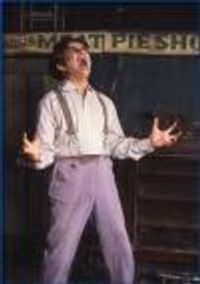Should an Author be judged by their Best Plays or their entire body of work?
Alex Kulak2
Broadway Legend Joined: 9/11/16
#1Should an Author be judged by their Best Plays or their entire body of work?
Posted: 6/20/19 at 11:16pm
Every artist is bound to have a few bad apples, but what about authors who's body of work has an incredibly wide range of quality?
Take, for example, David Mamet, who changed the American theatre landscape with American Buffalo, Glengarry Glen Ross, and Oleanna, but almost everything he's written in the 21st century has been a critical and commercial failure.
Those first three plays I mentioned are undeniably fantastic, but in studying his body of work, he's written far more bad plays than good plays. For every American Buffalo, there's a China Doll or The Anarchist or Keep Your Pantheon or The Woods.
When looking at a playwright, do you examine every play they've written, or just their best works?
#2Should an Author be judged by their Best Plays or their entire body of work?
Posted: 6/20/19 at 11:33pm
Yes.
UncleCharlie
Broadway Legend Joined: 6/26/16
#3Should an Author be judged by their Best Plays or their entire body of work?
Posted: 6/20/19 at 11:49pm
Looking at a playwright in what context? Their level of genius, their contributions to theater, their impact on the art form, their amount of overall success, the percentage of hits versus misses, the amount of commercial success versus critical success? The answer to "is someone a great playwright" is more complex than a yes or no. How many bands had 1 or if they're lucky 2 or 3 iconic albums and everything else after that was crap? Are they still great bands?
Updated On: 6/20/19 at 11:49 PM#4Should an Author be judged by their Best Plays or their entire body of work?
Posted: 6/20/19 at 11:56pm
Well, if you really wanted to get scientific, you could score each one out of 10 and calculate the average, with each play weighted equally? Art is subjective, and there's no real answer, but when someone's written as many godawful plays as Mamet, I think that needs to be taken into consideration.
In film, there's a theory that when a prolific director is "done," their last few works are never as good as their earlier work. It doesn't always carry over to theatre, but Mamet definitely qualifies, and to a lesser extent so do John Guare, Terrence McNally, Richard Greenberg, Theresa Rebeck, Richard Rodgers, Neil Simon, John Kander, and even Sondheim, to name a few. There's something to be said for the Jerry Hermans and Tommy Tunes of the world who "quit while they're ahead."
#5Should an Author be judged by their Best Plays or their entire body of work?
Posted: 6/21/19 at 12:10am
And then there's Tennessee Williams, who produced nothing but stellar content right up to the end!
#6Should an Author be judged by their Best Plays or their entire body of work?
Posted: 6/21/19 at 12:27am
Here's an idea: let's judge everyone by what celebrates their greatness. There are writers of singular masterpieces, and there are prolific writers for whom the whole is greater than the sum of the parts. Picasso is credited with 50,000 works of art, Da Vinci with 15. Do you really need to judge them on the same terms?
#7Should an Author be judged by their Best Plays or their entire body of work?
Posted: 6/21/19 at 12:53amShakespeare also wrote several clunkers (many of which were towards the end of his career as well), and some of even his most revered plays have not aged well and have elements some deem offensive. David Mamet is no Shakespeare, but like Shakespeare, he was a product of his time. The 1980’s in New York was a pretty different world. A lot has changed in three decades.
#8Should an Author be judged by their Best Plays or their entire body of work?
Posted: 6/21/19 at 10:11am
SomethingPeculiar said: "Well, if you really wanted to get scientific, you could score each one out of 10 and calculate the average, with each play weighted equally?"
I know you're offering this suggestion with a dash of irony, but wouldn't it make more sense to score each work (perhaps with negative scores possible for particularly egregious entries) and add them up rather than compute an average? If one author wrote five true masterpieces (each with a score of ten), and another author wrote just one, they'd have the same average, but surely we'd want to judge the first author more highly than the second.
#9Should an Author be judged by their Best Plays or their entire body of work?
Posted: 6/21/19 at 12:46pmWe all unanimously consider Neil Simon an excellent playwright even though he’s had his share of clunkers. Even with these, his work in them was still praised.
#10Should an Author be judged by their Best Plays or their entire body of work?
Posted: 6/21/19 at 2:51pm
Take, for example, David Mamet, who changed the American theatre landscape with American Buffalo, Glengarry Glen Ross, and Oleanna, but almost everything he's written in the 21st century has been a critical and commercial failure.
Oh, Mamet's an easy one to judge. I absolutely hate every play I've either read and/or seen by him. Zero value. And his latest sounds like he's hit a new low, which doesn't surprise me at all.
We all unanimously consider Neil Simon an excellent playwright even though he’s had his share of clunkers. Even with these, his work in them was still praised.
I saw the tryout of Proposals in DC and loved it. I was shocked it only ran a couple of months on Broadway. I also really enjoyed The Dinner Party. That cast was sublime.
You could ask the same regarding musical composers. Jule Styne, Cy Coleman and Charles Strouse had LOADS of flops. Do we judge them solely based on their hit/flop ratio? Not really.
#11Should an Author be judged by their Best Plays or their entire body of work?
Posted: 6/21/19 at 3:19pm
*cigar chomping voice* "Bill Shakespeare? That hack who wrote 'King John' and 'Coral-anus?' I don't CARE how good his hits were, I've seen his track record and I don't want him on my project. Get me someone else to write 'Hamlet.' What's that Roberto Aguirre-Sacasa guy working on? Now that fella has PEP."
VintageSnarker
Broadway Legend Joined: 1/30/15
#12Should an Author be judged by their Best Plays or their entire body of work?
Posted: 6/21/19 at 5:53pm
There's too much bias involved in a question like this. With any playwright, composer, etc. I like I will downplay their lesser works and for those I dislike, I'm more likely to count those lesser works against them.
I think it has to be a combination of both. Like, one great show doesn't shield someone from criticism but it can show what they're capable of. And a lot of bad shows establish a pattern, whether that's lack of genius, being unable to adapt commercial properties, laziness, etc.
Videos








